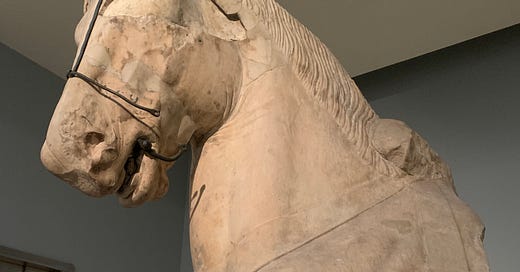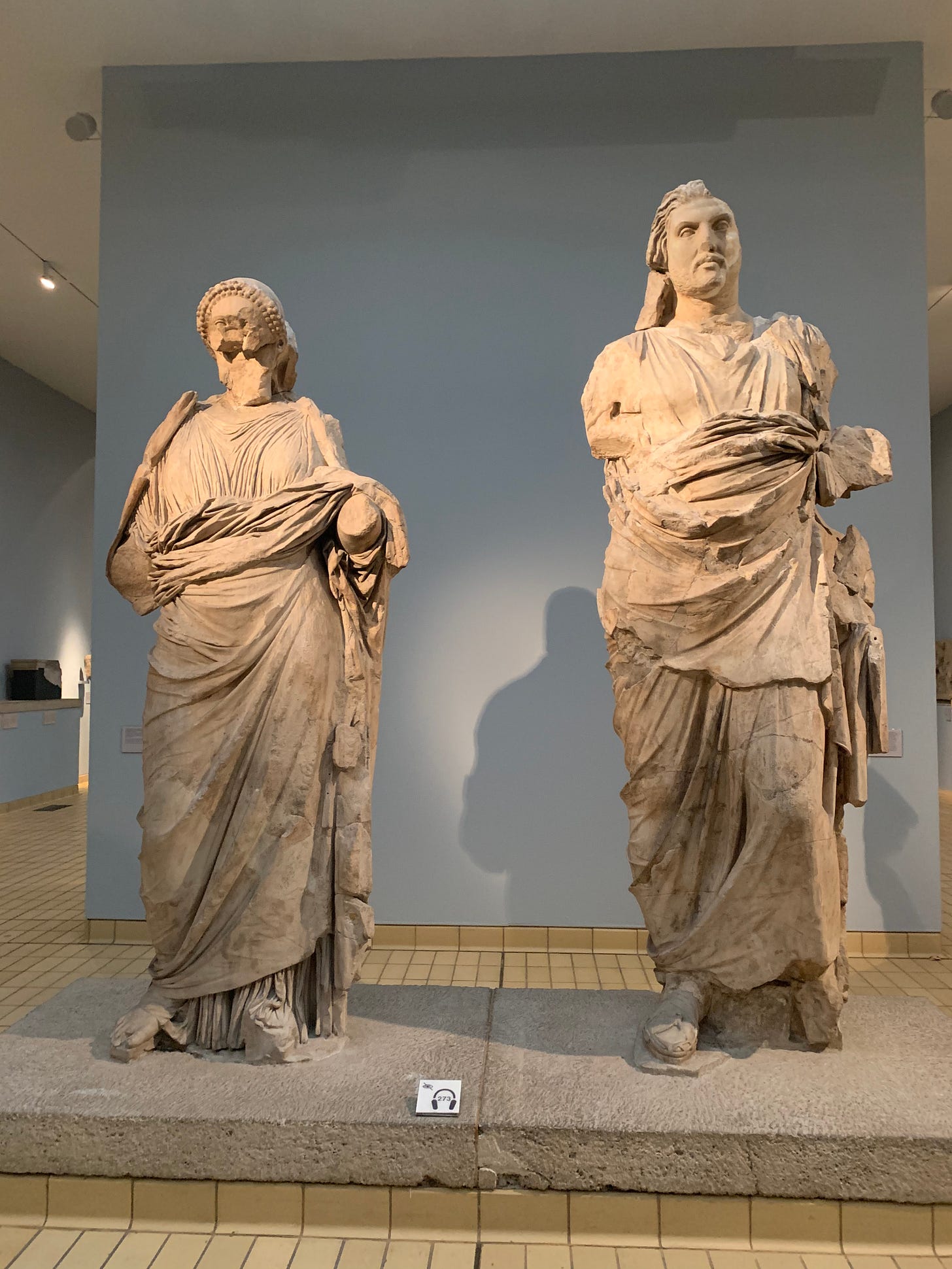Lesson Nine: Getting Back on the Horse
After breaking up with one book, how quickly do you get with another?
Six weeks after our wedding party, my ex-husband was in bed with another woman he’d met a few days previously. I remember the remark of my divorce lawyer when I told her: ‘Wow, he didn’t even stop to lick his wounds.’
I think I’ve spent longer getting over a particularly emotional book I’ve read. But anyway, each to their own.
On Friday of half term, I spent the day in London with my daughter and some old friends. We visited the British Museum, a place I have wanted to go all year. I wandered through Ancient Egypt, marvelling at the hieroglyphics, moved by the desire humans have always had to communicate with one another. And then we came to the room I had been most excited about — room 21.
This room contains the remains of one of the seven wonders of the ancient world — the mausoleum of King Mavsolos. The original wonder lay thousands of miles away in Bodrum, Turkey, (known as Halicarnassus back in the fourth century BC) a place where I lived in my twenties. The mausoleum is thought to have stood 42 metres high, decorated with friezes on all four sides and topped with marble statues of King Mavsolos and his sister-wife Artemisia II standing atop a chariot pulled by four horses. Today, the site is just rubble, but this place, these characters, form an important part of a novel I wrote over the summer, a novel I still can’t quite move on from, and I was mesmerised that I was finally standing at the feet of the ancient people who had in part inspired it. Here they are, though this photograph does nothing to capture the sheer size of them, at least ten feet tall.
Here too is a part of one of the horses that once drew the chariot that Artemisia II and King Mavsolos stood upon, the bronze bit in its mouth is the original and has survived in place for two and a half thousand years.
I finished editing this book in July, and I have not written another word of fictional prose since. I can’t, it’s as if this story is still flowing through my veins, I feel this fierce loyalty to it, I couldn’t even contemplate moving on yet — unlike my ex-husband…
But today is the start of NaNoWriMo, a month where writers sign up to produce 50,000 words of a novel by meeting a word count each day. You can sign up here. I would dearly love to join in but, I just can’t bring myself to move on.
So I was encouraged to read an interview over the weekend that put my mind at rest a little about how quickly we should get back on that horse once we’ve been writing.
Sarah Moss is a writer I really admire. I’ve loved her last three books, Ghostwall, Summerwater, and The Fell (forthcoming this month) which I was lucky enough to read earlier in the summer. She is most brilliant at capturing the human condition, the neuroses, the contradictions, the very act of being a living person and all it’s complexities. If you have never read her, I urge you to right away.
I was reading a great interview with Moss in the Guardian on Saturday which you can find here. The last paragraph struck me, and so I thought I’d share it with you.
‘Unusually, Moss is not writing at the moment. She has learned to be fine with that, or at least, after years of being anxious and controlling about her output, to weather the discomfort between books with more grace. Now, she says, “I’m more inclined to trust the process and see what happens.” She takes issue with a popular tenet of creative writing teaching – that you should write every day and keep writing. “Something I say to students is hold back for as long as you can, because if you’re writing the wrong thing – putting words on a screen is not an act of virtue. Leave it until you’ve got something that you want to say.”’
I agree with what she says about holding back, I can often feel a story percolating inside of me, bubbling and toiling away, and I have to resist the urge to force it onto the page but instead wait until it is ready to be birthed onto it (strangely enough the same applies to birthing humans). I remember the moment that I started on this second novel, I was trying to busy myself with other things, a bit of reading (Rebecca Solnit) to distract myself, and then suddenly I abandoned my book, went to my computer and sat down. Give or take toilet breaks, sleeping, eating and picking my daughter up from school, I did not stand up again until that book was finished. It is my very favourite of anything I’ve written, and the process in terms of how it appeared inside my computer is a mysterious one to me. I felt like merely a conduit, as if the story was already there, waiting for me.
Would I be cheating on it now if I started another? I am also too exhausted from our love affair to even consider creating another world and characters to people it. I simply cannot switch my affections that quickly when I had such a meaningful experience the last time.
It is the same, I think, when you are reading books. I recently read Lucy Caldwell’s short story collection, Intimacies, and I just had to read one story per day, letting the spark of lives and people burn out inside me before I picked up the book again and let another ignite in my brain. Isn’t that a sign of a good book? I’m sure you’ve had similar experiences with your own reading, and so of course that applies to writing too. If you’ve given all that blood, sweat and tears, if you’ve believed in something so much you’ve committed days, weeks, months, years, of unpaid hours to pin it to the page, how can you move on that quickly?
I know some people churn books out, props to them, but I don’t envy them. I am also in no way belittling their process when I say I am looking for a more meaningful experience — in books, in life, in love — we all work and live differently.
But Sarah Moss is right, putting words on the screen is not an act of virtue. Wait and commit when you really mean it, as Moss says ‘leave it until you’ve got something to say’ because that will also show in your writing, which will ultimately — and most importantly — make the earth move for your reader too.





